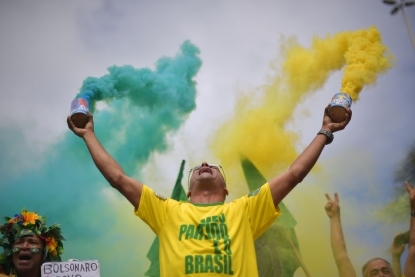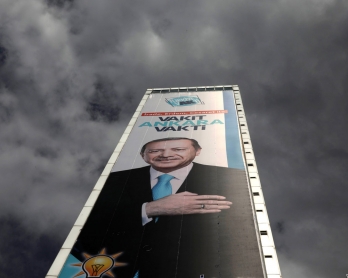Covering Brazil's new far-right leader
Rio de Janeiro -- AFP’s chief photographer for Brazil, Carl de Souza, was incredulous and with good reason.
It was the evening of the political earthquake that saw far-right populist Jair Bolsonaro elected president of South America’s most populous country and we, like most other media, didn’t have a single picture of the winner of the historic vote.
 Brazil's right-wing presidential candidate for the Social Liberal Party (PSL) Jair Bolsonaro gestures during a press conference in Rio de Janeiro, Brazil on October 11, 2018. - (AFP / Mauro Pimentel)
Brazil's right-wing presidential candidate for the Social Liberal Party (PSL) Jair Bolsonaro gestures during a press conference in Rio de Janeiro, Brazil on October 11, 2018. - (AFP / Mauro Pimentel)It wasn’t that Bolsonaro remained silent following the announcement of the election results. He had spoken three times. But all at his house -- two Facebook lives and a speech transmitted by two local television stations, Record TV and TV Globo. So we were left in a very unusual position -- not having a picture of the jubilant winner appearing before supporters and a nation that has elected him, as is custom in most democracies.
Bolsonaro had severely limited his appearances in front of crowds after he was stabbed in the abdomen during the campaign. On top of that, Bolsonaro painted himself as an outsider, determined to break with political traditions. Still, it didn’t really bode well for what his relations with the press, already strained during the campaign, would be after he would be sworn in.
 A supporter of far-right lawmaker and presidential candidate for the Social Liberal Party (PSL), Jair Bolsonaro, wears a mask with his face in Rio de Janeiro, Brazil, during the second round of the presidential elections, on October 28, 2018 (AFP / Carl De Souza)
A supporter of far-right lawmaker and presidential candidate for the Social Liberal Party (PSL), Jair Bolsonaro, wears a mask with his face in Rio de Janeiro, Brazil, during the second round of the presidential elections, on October 28, 2018 (AFP / Carl De Souza)As Mauro Pimentel, one of our Brazilian photographers told me: “It’s like we haven’t finished our coverage. The last photo of Bolsonaro is of him voting in the morning!”
We all wondered if this was a sign of things to come.
 Supporters of far-right presidential candidate Jair Bolsonaro, celebrate in front of the National Congress in Brasilia, after the former army captain won Brazil's presidential election, on October 28, 2018. (AFP / Sergio Lima)
Supporters of far-right presidential candidate Jair Bolsonaro, celebrate in front of the National Congress in Brasilia, after the former army captain won Brazil's presidential election, on October 28, 2018. (AFP / Sergio Lima)Photographers weren’t the only ones having a hard time capturing images of Bolsonaro. The day of the vote, cameramen were in front of the polling station in the Vila Militar neighborhood for hours, waiting for him. But Bolsonaro went in through the back. “It ended up being a shoving match, everyone just ran after him,” Marie Hospital, the head of video for AFP in Brazil, told me. “They don’t really want to work with the press.”
The only media who were allowed to film and photograph inside the polling station were chosen by a raffle the day before. AFP, present in Brazil since 1946 with bureaus in Rio, Brasilia and Sao Paulo, wasn’t accredited. Foreign television crews who had arrived two days before were. It was only thanks to our connections with local media that we ended up getting images from inside.
One AFP-TV team got invited to a post-election party at a Bolsonaro neighbor’s house in the Barra da Tijuca neighborhood. From the balcony overlooking the Atlantic, they were able to film thousands of Bolsonaro supporters celebrating as the people inside feasted on a sumptuous buffet, washed down with 2003 Dom Perignon and 1998 Mouton Rothschild.
 A man holds a gun at the 'Calibre 12' (Caliber 12) shooting club in Sao Goncalo, Rio de Janeiro, Brazil on September 03, 2018. (AFP / Daniel Ramalho)
A man holds a gun at the 'Calibre 12' (Caliber 12) shooting club in Sao Goncalo, Rio de Janeiro, Brazil on September 03, 2018. (AFP / Daniel Ramalho)Meanwhile down below, photographer Mauro Pimentel found himself amid the often aggressive supporters as they chugged beer and wondered about how many guns they were going to buy.
During the post-vote celebrations, photographers took off their press badges and television crews the logos off their microphones, as Bolsonaro supporters weren’t known for their love of the press. During the campaign there were 140 instances of violence against journalists, most of them carried out by far-right supporters. The aggressivity was sometimes such that photographers tried to avoid going alone to Bolsonaro supporters’ rallies.
 Supporters of far-right presidential candidate Jair Bolsonaro, celebrate after the former army captain won Brazil's presidential election, in Rio de Janeiro, Brazil, on October 28, 2018. (AFP / Daniel Ramalho)
Supporters of far-right presidential candidate Jair Bolsonaro, celebrate after the former army captain won Brazil's presidential election, in Rio de Janeiro, Brazil, on October 28, 2018. (AFP / Daniel Ramalho)Our video journalist in Sao Paolo had to stop a live segment because he was being insulted and harrassed by far-right supporters. A text reporter came back to the bureau earlier than expected on election day after a military police officer told him: “I’m going to ruin your Sunday. Get out of here or I’ll throw you down on the ground and handcuff you.”
 Demonstrators take part in a protest against Brazilian right-wing presidential candidate Jair Bolsonaro in Sao Paulo, Brazil, on October 20, 2018. (AFP / Nelson Almeida)
Demonstrators take part in a protest against Brazilian right-wing presidential candidate Jair Bolsonaro in Sao Paulo, Brazil, on October 20, 2018. (AFP / Nelson Almeida)One of the striking things about this election is that Bolsonaro campaigned almost exclusively via social media. He only gave a handful of interviews and most of these were carried out in a very informal tone, to say the least.
“I could have flatulence and you’ll have to stand aside because of the smell,” Bolsonaro warned Jose Luiz Datenna, the star journalist of TV Bandeirantes, during an interview broadcast live from his home a week after the election.
Later in the same interview, Datenna told the president-elect: “I always thought you were a great guy,” all the while thanking him for having received him in his “modest home of 240 square meters.”
 Journalists work in the street in front of the house of the businessman Paulo Marinho where Brazilian President-elect, Jair Bolsonaro, held a meeting, in Rio de Janeiro, Brazil, on October 30, 2018. (AFP / Mauro Pimentel)
Journalists work in the street in front of the house of the businessman Paulo Marinho where Brazilian President-elect, Jair Bolsonaro, held a meeting, in Rio de Janeiro, Brazil, on October 30, 2018. (AFP / Mauro Pimentel)The period following the election doesn’t bode well for relations between the press and Bolsonaro. “We are constantly running after his shadow,” is how Mauro Pimentel put it. Journalists spend hours in front of his house, just in case he decides to make an appearance or an announcement. On those rare occasions, only the journalists standing closest to the door get in.
Five days after his victory, he gave an impromptu press conference, allowing access to only a few media organizations, citing lack of space. AFP wasn’t one of the lucky ones. I would have liked to have protested, but there was noone to whom to do so -- Bolsonaro’s team still doesn’t have anyone in charge of press during the transition.
 Brazil's right-wing presidential candidate for the Social Liberal Party (PSL) Jair Bolsonaro walks in front of the Brazilian flag as he prepares to cast his vote during the general elections, in Rio de Janeiro, Brazil, on October 7, 2018. (AFP / Mauro Pimentel)
Brazil's right-wing presidential candidate for the Social Liberal Party (PSL) Jair Bolsonaro walks in front of the Brazilian flag as he prepares to cast his vote during the general elections, in Rio de Janeiro, Brazil, on October 7, 2018. (AFP / Mauro Pimentel)Bolsonaro has already warned that major announcements will come from him via social media. His team has a deep mistrust of foreign media -- much more critical than the local press, media like The New York Times, The Economist, The Guardian and El Pais had all published pieces ahead of the election warning against voting for the populist leader.
The president-elect doesn’t seem to hold much love for the local press either -- following his victory, he told the country’s largest newspaper, Folha de S. Paulo, which had written about apparent voter fraud organized by Bolsonaro’s team on WhatsApp, that it “was finished” because he would pull official advertising from the daily. “The people will decide which media will survive,” Bolsonaro announced, sending shivers through Brazilian newspapers that rely on government advertising.
 Brazilian right-wing presidential candidate Jair Bolsonaro gestures after being stabbed in the stomach during a campaign rally in Juiz de Fora, Minas Gerais State, in southern Brazil, on September 6, 2018. (AFP / Raysa Leite)
Brazilian right-wing presidential candidate Jair Bolsonaro gestures after being stabbed in the stomach during a campaign rally in Juiz de Fora, Minas Gerais State, in southern Brazil, on September 6, 2018. (AFP / Raysa Leite)All this was hard to imagine just a few months ago, on September 6, when Bolsonaro was stabbed at a rally, with the knife puncturing his intestine. By chance, he wasn’t far from a hospital and within 15 minutes was in an operating room, having already lost 40 percent of blood.
“You’ve just elected the president of the republic,” his son, Flavio, a senator, shouted as he arrived to be at his father’s side.
I remember finding the phrase odd. At the time, noone gave Bolsonaro a chance and all polls showed he would lose in the second round.
 A supporter of far-right lawmaker and presidential candidate for the Social Liberal Party (PSL), Jair Bolsonaro, takes part in a pro-Bolsonaro demonstration in Rio de Janeiro, Brazil, during the second round of the presidential elections, on October 28, 2018. (AFP / Carl De Souza)
A supporter of far-right lawmaker and presidential candidate for the Social Liberal Party (PSL), Jair Bolsonaro, takes part in a pro-Bolsonaro demonstration in Rio de Janeiro, Brazil, during the second round of the presidential elections, on October 28, 2018. (AFP / Carl De Souza)His stabbing and recovery gave him a push. As he himself says “God had me elected.” “And social media.”
The stabbing left a mark on Bolsonaro. If before he adored being carried on the shoulders of supporters, today he avoids crowds. He now moves around with a convoy of armored vehicles and motorcycles and several dozen members of federal police’s elite squad.
Bolsonaro is an admirer of US President Donald Trump and has adopted his hero’s attitude toward the press, branding it a factory of “fake news.”
Like its large neighbor in the north, Brazil now also has a president whose preferred method of communication is to tweet.
 A supporter of far-right lawmaker and presidential candidate for the Social Liberal Party (PSL), Jair Bolsonaro, wears a mask of US President Donald Trump as he celebrates after Bolsonaro won Brazil's presidential election, in Sao Paulo, Brazil, on October 28, 2018. (AFP / Miguel Schincariol)
A supporter of far-right lawmaker and presidential candidate for the Social Liberal Party (PSL), Jair Bolsonaro, wears a mask of US President Donald Trump as he celebrates after Bolsonaro won Brazil's presidential election, in Sao Paulo, Brazil, on October 28, 2018. (AFP / Miguel Schincariol)




